Your brain craves evening therapy sessions because they perfectly align with your body's natural sleep-wake cycle. When you engage in therapeutic activities like BEMER or heat therapy in the evening, you're working with your hypothalamus and pineal gland's natural melatonin production schedule. These sessions can boost your sleep efficiency across all stages – from light to deep sleep – while reducing inflammation and enhancing recovery. The timing also helps lower your core temperature and anxiety levels right when your body needs it most. Understanding how to leverage this biological advantage can transform your sleep quality entirely.
The Science Behind Evening Recovery

The science behind evening recovery reveals fascinating insights into our body's natural healing processes. Your hypothalamus plays a vital role, housing the suprachiasmatic nucleus (SCN) that monitors light exposure and controls your behavioral rhythms.
As evening approaches, the SCN signals your pineal gland to release melatonin, preparing your body for sleep. Those experiencing disrupted sleep patterns often notice their pain threshold decreases, making chronic discomfort more challenging to manage.
You'll find multiple therapeutic approaches that enhance this natural process. BEMER therapy increases your sleep efficiency across all stages – light, REM, and deep sleep – while promoting healing and reducing inflammation. If you're dealing with chronic pain, you'll benefit from improved pain tolerance through enhanced sleep quality.
For deeper sleep enhancement, you can try sauna bathing. A 20-minute session at 176 degrees Fahrenheit, taken 1-2 hours before bed, increases your growth hormone and prolactin levels.
These hormonal changes actively promote deeper sleep stages and regulate slow-wave sleep patterns.
Your sleep-wake homeostasis continuously tracks your need for rest, building sleep pressure throughout your waking hours. Understanding this biological rhythm helps you optimize evening recovery through strategic timing of therapeutic interventions like neurofeedback and ketamine therapy.
Red Light's Neural Reset Power
Modern neuroscience has revealed red light therapy's remarkable ability to reset and rejuvenate your neural pathways. When you expose your body to specific wavelengths between 633-1065nm, you're activating a powerful cellular response that enhances your brain's natural recovery processes. Your neurons' mitochondria become more efficient, producing more ATP and boosting your cellular energy levels. A distinctive advantage of evening therapy is the ability to perform treatment using LED therapy wraps while relaxing at home.
You'll benefit from red light therapy's dual action on your nervous system. First, it improves blood circulation, delivering essential oxygen and nutrients to your nerve cells. Second, it stimulates neurogenesis – the creation of new neurons and synaptic connections. This combination makes it particularly effective for evening sessions, as it helps prepare your brain for nighttime repair and regeneration.
What's particularly fascinating is how red light therapy works systemically, even affecting areas not directly exposed to the light. When you use it in the evening, you're supporting your brain's neuroprotective mechanisms and reducing inflammation.
The therapy's ability to enhance mitochondrial efficiency and promote BDNF production creates ideal conditions for neural recovery, making it an ideal component of your evening wellness routine.
Heat Therapy After Sunset
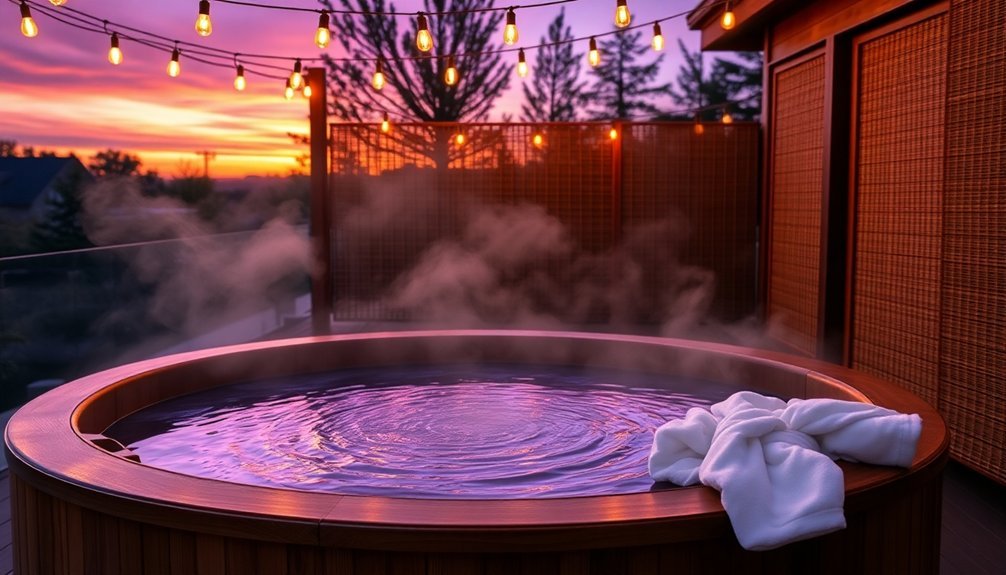
During the evening hours, heat therapy emerges as a powerful catalyst for optimizing your sleep-wake cycle. When you expose yourself to heat 1-2 hours before bedtime, typically through a 20-minute sauna session at 176°F, you'll trigger a cascade of sleep-promoting physiological responses. Heat therapy sessions can serve as an excellent addition to your bedtime routine, training your brain to recognize it as a sleep signal.
The heat temporarily raises your core temperature, and when you cool down afterward, it signals your body to produce melatonin. This temperature drop fundamentally resets your circadian clock, preparing you for deep sleep.
You'll also experience a surge in growth hormone and prolactin levels, which are vital for achieving high-quality slow-wave sleep.
To maximize these benefits, you'll want to establish a consistent evening heat therapy routine. Combine your session with stress-reducing breathing techniques, and make certain you're giving yourself enough cooling time before bed.
The heat exposure stimulates the release of somnogenic cytokines, enhancing your immune function while reducing stress hormones like cortisol. Remember to keep your bedroom cool and dark afterward to complement the therapy's effects.
When you maintain this practice regularly, you'll likely notice significant improvements in both your sleep quality and duration.
Optimizing Your Sleep Architecture
Building on the foundation of evening heat therapy, optimizing your sleep architecture requires a thorough approach to both environmental and behavioral factors. You'll need to focus on reducing nighttime awakenings while creating ideal sleeping conditions that support your body's natural rhythms.
Start by transforming your bedroom into a sleep sanctuary. Set your thermostat to around 65 degrees and eliminate all sources of light, including electronic devices. Consider tracking your sleep efficiency percentage to ensure you're getting quality rest during your time in bed.
You'll want to establish a consistent bedtime routine that signals to your body it's time to wind down. This might include relaxation techniques like deep breathing or meditation.
To maximize your sleep efficiency, you'll need to address both physical and mental aspects. Don't spend excessive time in bed when you're not sleeping, and avoid caffeine or heavy meals before bedtime.
During the day, get morning sunlight and engage in physical activity, but not too close to bedtime.
If racing thoughts keep you awake, try journaling earlier in the evening to process the day's events. Consider cognitive-behavioral therapy techniques if stress and anxiety consistently disrupt your sleep patterns.
Evening Sauna Benefits
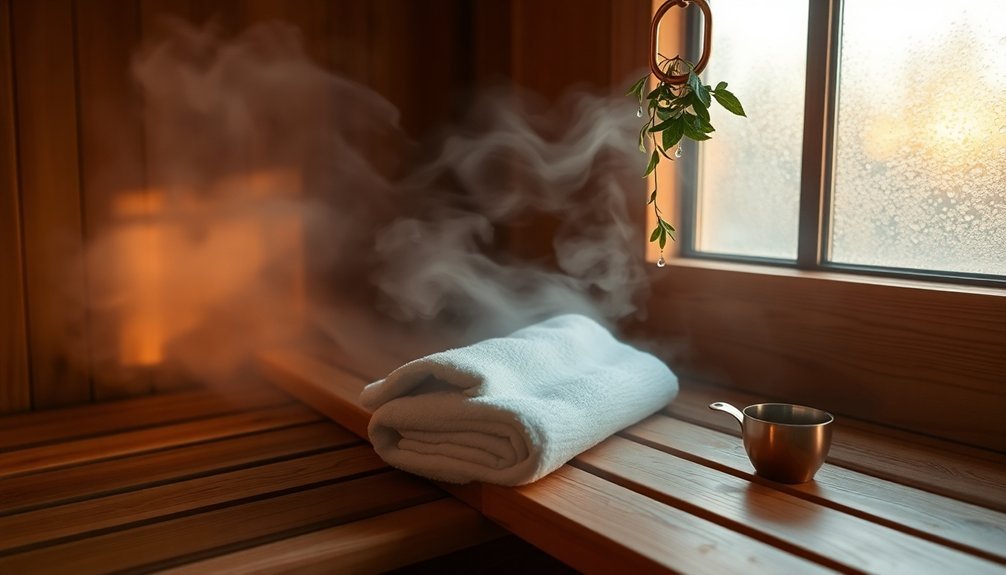
Tranquility awaits those who incorporate evening sauna sessions into their sleep routine. When you step into a sauna before bedtime, you're setting yourself up for deeper, more restorative sleep. Your body temperature rises during the session, then drops afterward, triggering a natural sleep response that can boost deep sleep by up to 70% within the first two hours.
You'll experience multiple benefits beyond just better sleep. Your cardiovascular health improves as the sauna reduces blood pressure, arterial stiffness, and inflammation. If you've exercised during the day, you'll find your muscles recovering faster due to increased blood flow and reduced tension. Gentle stretching during your session can further enhance muscle recovery and flexibility.
What's particularly fascinating is how evening sauna sessions influence your hormonal balance. The heat stimulates your pineal gland to produce more melatonin, your body's natural sleep hormone. This boost in melatonin not only helps regulate your sleep-wake cycle but also extends your REM sleep duration.
Additionally, you'll benefit from increased endorphin release, which creates a state of calm and relaxation perfect for shifting into sleep. The combination of temperature regulation, hormonal balance, and muscle recovery makes evening sauna sessions a powerful tool for optimizing your sleep quality.
Brain Waves and Light Exposure
Through careful management of light exposure, you can enhance your brain waves for better sleep. When you're exposed to bright light in the evening, especially from screens, you're disrupting your body's natural melatonin production, which is vital for initiating sleep.
To protect your sleep quality, you'll want to dim the lights about two hours before bedtime. Setting up a sleep-conducive environment will promote healthier rest throughout the night.
Your brain's slow-wave activity, which is essential for memory formation and consolidation, becomes compromised when you're exposed to light during sleep. Even sleeping with a light on reduces your deep sleep quality and increases the likelihood of frequent wake-ups.
You'll experience less slow-wave sleep and more shallow sleep stages, which isn't ideal for memory processing and overall restoration.
Your circadian rhythm responds strongly to light cues, particularly in the morning and evening hours. You can strengthen your sleep-wake cycle by getting bright light exposure in the morning and gradually reducing light as evening approaches.
This pattern helps synchronize your brain waves for superior sleep architecture, supporting those critical slow, synchronous waves that make your cerebral cortex receptive to processing and storing information during deep sleep.
Timing Your Therapeutic Sessions
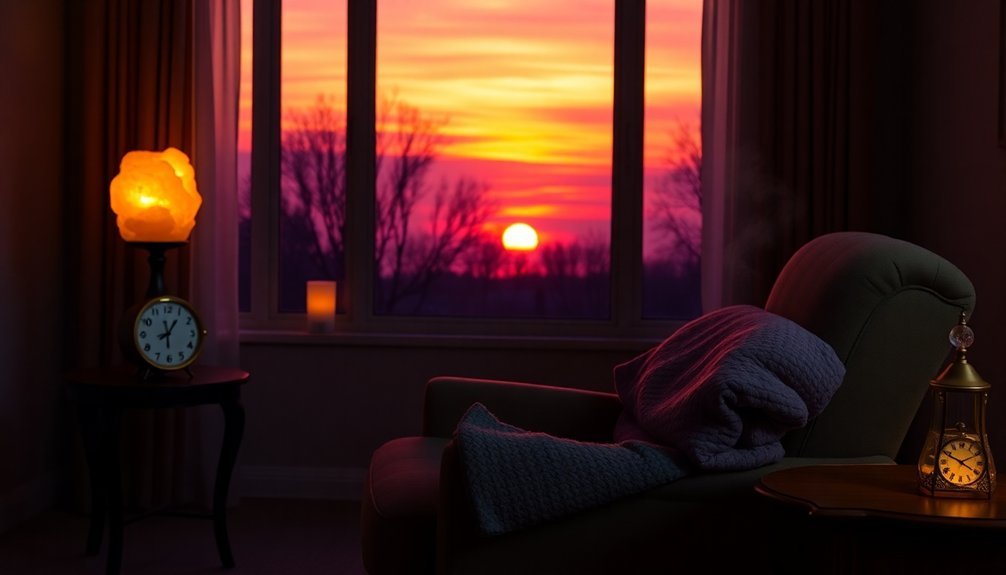
Your body's natural rhythms can make evening therapy sessions highly effective during peak mental performance hours, typically occurring between 6-8 PM.
You'll notice that evening sessions allow your mind to process the day's events while resetting your biological clock for improved sleep patterns. Evening sessions provide a perfect opportunity for deeper emotional work as you wind down.
Evening therapy can create a natural shift between daytime stress and nighttime relaxation, helping you establish healthier evening routines.
Evening Peak Performance Hours
Deciding when to schedule therapy can substantially impact your treatment's effectiveness, especially during evening hours at Peak Performance. You'll find Tuesday sessions available until 7:00pm, offering flexibility for your busy schedule while maintaining therapeutic benefits.
Evening sessions can help you unwind after work while enhancing your focus due to fewer distractions. You're likely to experience better retention of therapeutic insights during these hours, as your mind shifts from daily stressors to a more reflective state. Physical stimuli therapy can be particularly effective during evening sessions when muscles are naturally warmer and more responsive to treatment.
| Time Benefits | Personal Impact |
|---|---|
| Reduced daytime stress | Better mental preparation |
| Enhanced focus | Improved therapy retention |
| Flexible scheduling | Work-life balance |
| Natural wind-down | Consistent routine |
| Better accessibility | Increased adherence |
When considering evening therapy, you'll want to evaluate how it affects your sleep patterns. While evening sessions can provide mental preparation for better rest, you should discuss with your therapist how to structure sessions that don't overstimulate you before bedtime. You can integrate these sessions into your routine by making appropriate lifestyle adjustments that support both your therapeutic journey and sleep schedule.
Biological Clock Reset Benefits
Strategically timing your therapeutic sessions can help reset your biological clock and optimize your mental health outcomes. By scheduling therapy in the evening, you're working with your body's natural circadian rhythm adjustments, which can enhance the therapeutic process and promote better sleep-wake cycles.
Evening sessions give you the opportunity to process your day's experiences while gradually preparing your body for rest. You'll benefit from the natural drop in body temperature and the release of sleep-promoting hormones that occur in the evening hours.
This timing helps create a bridge between therapy and sleep, allowing your brain to consolidate therapeutic insights during deep sleep phases.
When you combine evening therapy with consistent sleep schedules and proper light exposure management, you're strengthening your circadian rhythm regulation. You can enhance these benefits by avoiding bright light exposure after your session and maintaining regular meal times.
If you're struggling with circadian rhythm disorders, evening therapy sessions can become part of your broader treatment strategy, working alongside other interventions like light therapy and lifestyle adjustments to reset your biological clock effectively.
Natural Sleep Hormone Production
The body's natural production of melatonin follows a precise daily rhythm that's essential for healthy sleep patterns. Your pineal gland orchestrates this process, releasing more melatonin when it's dark and less when you're exposed to light. During evening therapy sessions, you'll naturally align with this biological process as daylight diminishes.
| Sleep-Supporting Element | How It Works |
|---|---|
| Darkness | Triggers your pineal gland to increase melatonin production |
| Tryptophan-rich foods | Provides raw materials for melatonin synthesis |
| Evening timing | Matches your body's natural melatonin release cycle |
| Reduced light exposure | Prevents melatonin suppression |
| Consistent schedule | Strengthens your circadian rhythm |
You can enhance your natural melatonin production by consuming foods rich in melatonin before your evening session. Try incorporating eggs, warm milk, or nuts like pistachios and almonds. If you're struggling with sleep, you'll find that timing your therapy sessions with your body's natural melatonin production cycle can substantially improve your sleep quality. Your eyes' retinas communicate light information to your brain, so maintaining a dimly lit environment during evening sessions supports your body's natural sleep hormone production.
Temperature Regulation for Sleep
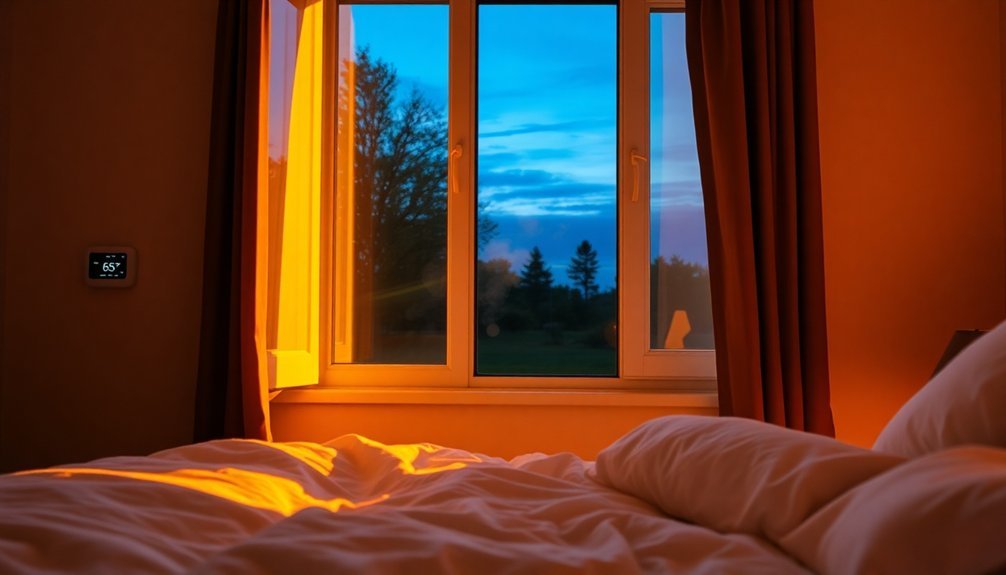
During evening therapy sessions, maintaining proper temperature regulation plays a critical role in promoting quality sleep. Your body naturally prepares for sleep through a decline in core temperature, which is essential for both initiating and maintaining restful sleep.
You'll get your best sleep in a cool room between 60-67°F (15.5-19.4°C). This temperature range supports your body's natural cooling process and helps trigger the onset of sleep.
If you're looking to enhance this effect, you can try the 'Warm Bath Effect' by taking a warm bath a few hours before bedtime. This practice helps induce vasodilation and subsequent cooling, which shortens the time it takes you to fall asleep.
Your brain's preoptic/anterior hypothalamus region coordinates this temperature regulation with sleep. When you're preparing for sleep, warm-sensing neurons activate while your peripheral blood vessels dilate to release heat.
You can support this process through behavioral choices like creating a warm microclimate with blankets while keeping your room cool. Even small changes in skin temperature can substantially impact your sleep quality, so it's worth paying attention to your evening temperature environment.
Resetting Your Body Clock
Successfully resetting your body clock requires a systematic approach that aligns with your natural circadian rhythm. You'll need to make gradual adjustments to your sleep schedule, typically shifting by 15 minutes each week, rather than attempting dramatic changes that can disrupt your internal clock.
Start by establishing consistent wake-up times using an alarm, even on weekends. You'll want to expose yourself to natural light first thing in the morning, as this helps regulate your melatonin and cortisol levels.
Plan your meals at regular times, with dinner scheduled at least a few hours before bedtime, and consider implementing a 16-hour fasting window between dinner and breakfast.
To support your reset efforts, you'll need to minimize naps and reduce exposure to blue light in the evening. Instead, engage in relaxation techniques like reading or meditation as bedtime approaches.
Regular outdoor activities during daylight hours will help synchronize your body's rhythm with natural light cycles.
Remember that consistency is key – maintain your new schedule rigorously, as this helps your body establish and retain its adjusted circadian rhythm through the regulation of sleep hormones.
Frequently Asked Questions
Can Certain Medications Interfere With the Benefits of Evening Therapy Sessions?
Yes, your medications can interfere with therapy sessions, especially sedatives and antidepressants, which may reduce alertness and emotional engagement. Always tell your therapist about any medications you're taking for the best results.
How Do Caffeine and Alcohol Consumption Affect Evening Therapy Effectiveness?
Your evening therapy's effectiveness can decrease if you consume caffeine within 8 hours before, or alcohol within 3 hours before sessions. Both substances can disrupt your mental clarity and emotional processing abilities.
Are Evening Therapy Sessions Safe for People With Heart Conditions?
Yes, you'll generally find evening therapy sessions safe with heart conditions, but you should monitor your exertion levels. Stick to relaxation-focused activities and avoid vigorous exercises that could strain your heart.
What Role Does Genetics Play in Individual Responses to Evening Therapy?
Your genetic makeup can substantially influence how you'll respond to evening therapy. Your unique circadian genes and sleep-related genetic variations determine your body's natural rhythms and therapeutic effectiveness during nighttime sessions.
Can Evening Therapy Sessions Help With Sleep Apnea Symptoms?
You'll find evening therapy sessions can help manage sleep apnea symptoms through respiratory training and diaphragmatic breathing exercises. They're most effective when combined with your primary treatment like CPAP or oral appliances.
In Summary
You'll gain the most recovery benefits by strategically timing your therapy sessions in the evening hours. Whether it's red light exposure, sauna sessions, or heat therapy, you're working with your body's natural circadian rhythm. By aligning these practices with sunset, you're optimizing your deep sleep potential and enhancing your body's natural melatonin production. Remember, it's not just what you do, but when you do it that matters.
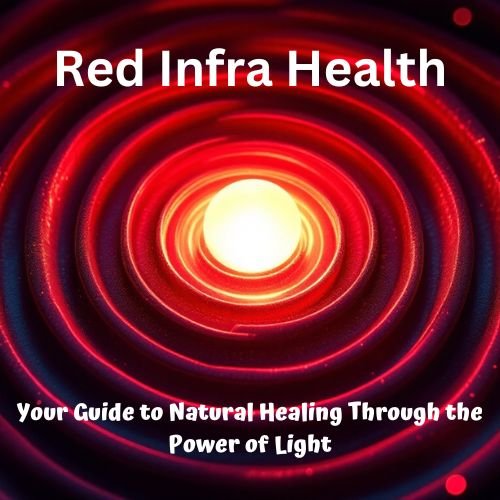
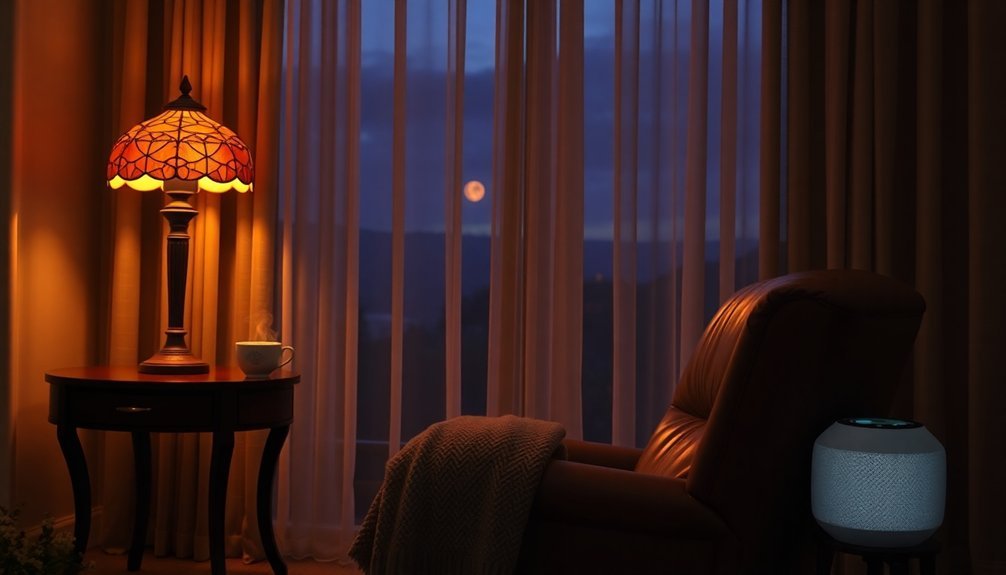

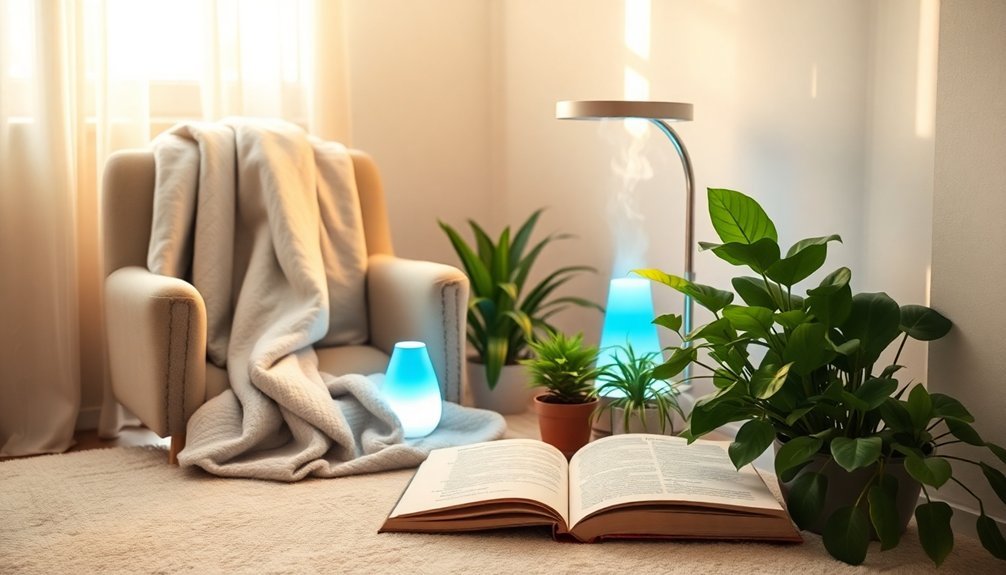
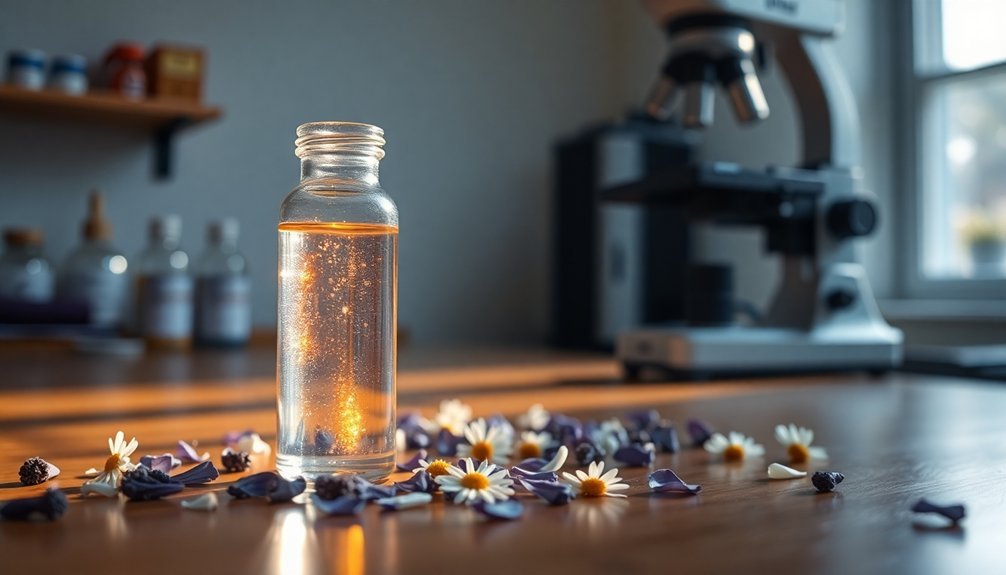
Leave a Reply